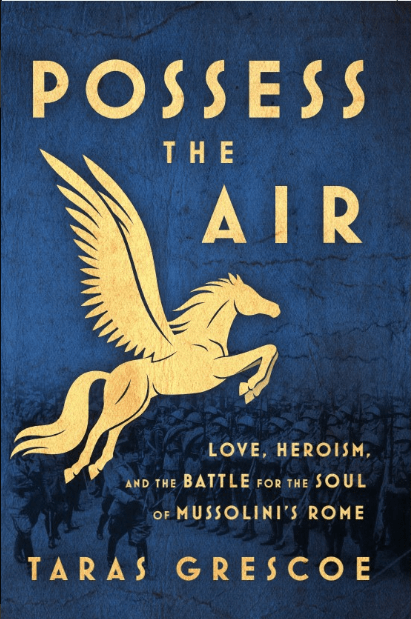Possessing the Air: Lessons in Defiance from Il Duce’s Rome
Lisa Van Dusen
December 30, 2019
From the first sentences of the prologue to Possess the Air, it’s clear that Taras Grescoe belongs to one of history’s least exclusive clubs; humans who are romantic about Rome.
“A lucky walker in Rome, weary of dodging gelato-eaters and rushing motorini, may be lured out of the teeming streets of Trastevere by the prospect of the upward-sloping paving stones of the sycamore-shaded Via Garibaldi,” writes Grescoe, introducing his inamorato perspective along with the role he’s assumed as Sherpa to both the city and its history.
Grescoe’s forensic rendition of Rome’s beauty is essential to the journey to come, providing as it does the context for the dissonant rise of Benito Mussolini like a vulgar, anthropomorphic gnome in the garden of Botticelli’s Primavera.
Possess the Air: Love, Heroism and the Battle for the Soul of Mussolini’s Rome is the seventh book from an author who established his talent as both a writer and cultural anthropologist in 2000 with Sacré Blues, an affectionately irreverent outsider’s look at Québec culture, from the galactic inescapability of Céline Dion’s tremolo to the baroque annual rituals of the Festival Western de Saint-Tite. Grescoe, who has since written about the evolution of travel in a smaller and smaller world, the urban scourge of the automobile and one previous work of historical non-fiction, Shanghai Grand, gamely settled in Montréal in the wake of the local succès de scandale of Sacré Blues.
Possess the Air, which would be a great read in good times, is especially engrossing now as a study of how — given a combination of motive, opportunity, pathology and resources — Fascism, incrementally and systematically, can transform a society. Grescoe accomplishes this by telling the stories of individuals living in Rome during the 1920s and 30s — Italians, expat Canadians and Americans; writers, journalists, actors and adventurers — and how the world of what was allowed and what was punished, what was rewarded and what was fatal, perilously changed around them. The title refers to a spectacular stunt by Lauro de Bosis, the dashing poet, Harvard lecturer, resistance pamphleteer and target of Mussolini’s wrath who learned to pilot a plane long enough to airdrop thousands of anti-Fascist leaflets over Rome on Oct. 3, 1931, as Il Duce was meeting with his cabinet.
The book never mentions the words “Trump”, “fake news” or “post-truth”, which is refreshing since Donald Trump is no more the core of the world’s current anti-democracy problem than Benito Mussolini was the 20th century’s most malignant monster. The chill of recognition in the parable comes from the reminders throughout that anti-democracy despots of convenience come with an ACME brutality kit that invariably includes proxy thugs, deterrent scapegoating, co-opted journalism, industrialized deception, intelligence-insulting propaganda, corrupted courts, a sweeping and adaptable definition of “enemy of the state”, and an insidious infatuation with granular, obsessive surveillance. The modus operandi isn’t new, even if some of the tools are.
That the destructive potential of the weapons has been compounded by the lack of detection, attribution and accountability that 21st-century technology affords goes without saying. As Uyghurs in Xinjiang, Mexican journalists hacked and tracked by Pegasus and the ghost of the cyberstalked and slaughtered Jamal Khashoggi might attest, possessing the air is more complicated in a time of cyberfascism than it was in a time of analog Fascism.
The hope, like the fear, lies in the history. Just as humanity’s worst instincts have been leveraged cyclically to spread terror, obliterate freedom and pervert power, we always, inevitably, breathe and walk and think through the shock and disbelief to a defiance that starts small, spreads and turns the tide. Always.
Lisa Van Dusen is associate editor of Policy Magazine and a columnist for The Hill Times. She was Washington bureau chief for Sun Media, international writer for Peter Jennings at ABC News, and an editor at AP in New York and UPI in Washington.

